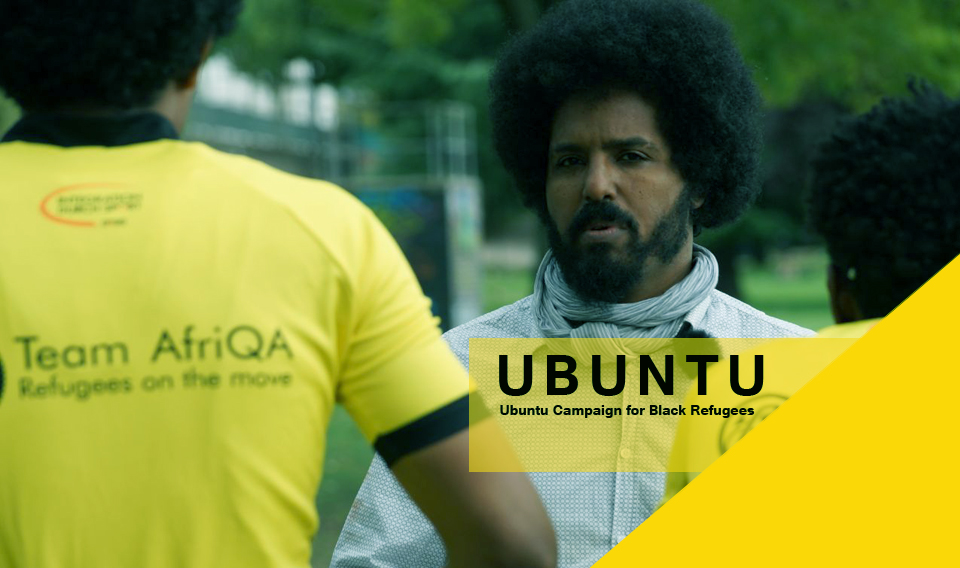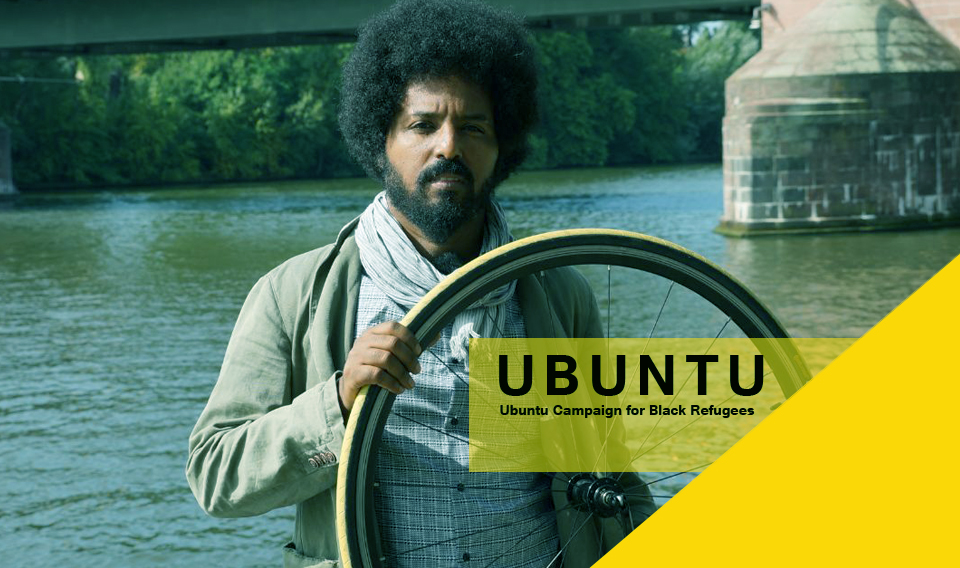“We’re against all forms of discrimination and that’s why we are using all of our power against what is happening to Black bodies in Libya.
” Zerai’s voice was low and level, and although we spoke over the phone I could feel the unwavering conviction in his words. The power he is talking about is in reference to The Ubuntu Campaign for Black Refugees, a bike tour, set to begin in Frankfurt, Germany in September 2017. It will span across multiple countries throughout Europe. The destination? Raising awareness in as many places as possible about the atrocities Black people are experiencing by seeking refuge in Europe. “We will be as loud as possible.” He says.
Founder of Projekt Moses e.V., a charity for youth and social projects, as well as a leader at the Ubuntu House in Frankfurt, Zerai supports refugees across the African Diaspora with social, entrepreneurial and environmentally sustainable projects. The Ubuntu House also serves as a basis for exhibitions and international affairs that bridge the gaps between different cultures, generations and languages. As an Eritrean father, brother, activist, and avid bike rider, Zerai’s work doesn’t end at closing time. He is involved in many different ventures, but they all hold a common objective: To disrupt Western (see: racist) narratives around Black bodies and to challenge the policies based on them.
One must not search long to witness the cooperation and organization Zerai has dedicated to different projects in Europe in order to raise awareness for Black refugees seeking asylum here, and the list is both imaginative and humbling. In 2015, he created the now famous HannsM twitter account, which launched a frenzy of local treasure hunts in the Frankfurt area. Leaving money in public spaces, HannsM then tweeted out maps where citizens could (and would) discover not just the big bucks, but something else as well: Current photos of Black refugees struggling to survive in Libya to get to Europe. Alongside these images, historical photos of Germans like Hans Conrad Schumann, who also embodies the plight of a “refugee”. Schumann was an officer who, in 1961, defected from his East-Berlin post and jumped over the fence that would become the Berlin Wall while a by-standing photographer captured the amazing moment. The picture went on to become one of the most famous illustrations of the grim reality of borders. It was titled “The Leap into Freedom”. Just fifty years later, the photos juxtaposed with cold cash feel bitterly ironic. In a Deutsche Welle interview, Zerai recounted the way dozens of people (including the police) showed up for one of his treasure hunts, “And I thought, 'Look how these people are crazy about cash.' It's just the same as Eritrean or African refugees. [But] they are not looking for extra money, they have to secure their existence.".
Since then, Zerai has continued working to elevate the struggles of Black people seeking refuge in Europe, especially those coming through Libya. Most people migrating through Libya are coming from Egypt, Niger, Sudan, Nigeria, Bangladesh, Syria, and Mali. While over 60 million people are currently displaced around the globe, last year more people fled from the Democratic Republic of Congo than any other country in the world. And although Black refugees must cross through unfamiliar terrain, language barriers, and bureaucracy like all people seeking asylum, they must also navigate these obstacles with the added threat of anti-Blackness that many countries along their journeys are culturally and institutionally submerged in. This is clearest in Libya, where Tripoli lawyer Shokri Agmar has seen the exclusive danger and vulnerability Black Bodies are up against, and he described it as such:
“Us, Libyans, rely on our own militias to protect ourselves but migrants lack a militia of their own so they are defenseless against the constant threats. Whatever happens to them, no one will lift a finger, and they cannot keep a low profile because of the color of their skin.” Women and children are most vulnerable to the nightmares lurking in Libya. Less than six months ago, Deputy Executive Director of Unicef Justin Forsyth described official detention centers in Libya as “hellholes” that women and children disappear in. Black refugees are more vulnerable to the dangers that come with trying to flee conflict and poverty at home than any other asylum seeker.
“Those who are attempting to get to Europe through Libya suffer the worst crimes against humanity, including present-day enslavement, rape, and organ harvesting.” Zerai’s words reverberate through me. He continues, “This is why the campaign is against policies seeking to ‘safeguard’ European borders. They’re inhumane.” I think of the millions of Hans Conrad Schumanns who don’t even have the chance to leap into freedom.
That is what Zerai hopes to change with his latest campaign.
“The goal of The Ubuntu Campaign for Black Refugees is to spread awareness about the nuanced atrocities 3 million people from South of the Sahara endure every single day… trapped in Libya for trying to seek safety in Europe.” Just two years after HannsM took on Twitter, Zerai has new plans to generate big buzz on and off social media once more. Through the Ubuntu Campaign for Black Refugees, he and other activists and allies will complete a multi-leg bike tour through Europe in order to amplify the afflictions of asylum seeking Africans, and demand the appropriate cultural and institutional changes throughout Europe so that we responsibly and empathetically alleviate this situation.
The campaign will stop in the European cities making the biggest decisions regarding people seeking refuge here. The first leg of the tour will leave from Frankfurt in September and cover five days of campaigning across the country, before arriving in Belgium to demonstrate before the European Parliament in Brussels. “Our demand,” Zerai says, “Is that all people seeking refuge and protection in Europe have an equal chance at finding safety and new opportunities -- regardless of nationality, skin color, gender, or culture.”
Other tour-legs include stops in Geneva, Switzerland, which holds the UN headquarters, and Palermo, Italy, the main entry point for survivors coming from Libya via boat. Currently, the head of the EU border agency Frontex has called for a re-evaluation of NGO sponsored sea rescue missions, which could stop more than 40% of rescue missions if NGOs are banned from their efforts.
Palermo, in particular, encompasses hope and tragedy for millions of people; It is the thought in the young woman’s head trapped in a Libyan “detention facility”, a source of hope to survive; To arrive in Palermo is to taste the first milk and honey of the promised land. And for thousands, Palermo is the thought submerged in their final breaths on an unimaginable journey taken on a boat too small, too full, and too late.
With these truths rooted in the heart, Zerai and other activists and citizens will stop at the waterfront in Palermo to express these concerns - to reflect on the hardships faced by those who survived to the shore, and those who died on the way. One thousand balloons will be released to symbolize the voices of the deprived, and honor the millions of untold stories.
“The campaign is based on a desire to live in a society where empathy and sympathy are offered to people who are in difficult situations, where people who are treated unfairly are given a voice.” His words are softer now, and perhaps that makes them even sharper. I thank Zerai for the interview, hang up the phone, and look over my notes.
I am inspired by Zerai’s courage and deeply saddened by the situation so many of my siblings face right now. It is estimated that 1 in 122 people on the planet is either a refugee, internally displaced, or seeking asylum. According to the UN Refugee Agency, “If this were the population of a country, it would be the world’s 24th biggest.”
It’s easy to read the numbers and feel hopeless. It’s lazy to read the stories and feel powerless. If you can read this right now, that means you can read. English. And have access to an electronic device to do so. You probably live in the West, like me, and I’ll reasonably assume you care about this topic if you’ve made it this far into this article. So what can we do?
Each leg of the Ubuntu Campaign for Black Refugees can be independently and locally supported. This means the people who take part will play a huge role in the overall  campaign. And there are many ways to get involved. The campaign begins in Frankfurt, and will stop not only in major cities, but smaller cities and towns along the way to each destination. See if they’re stopping in your city. Participate! Grab your bike and go!
campaign. And there are many ways to get involved. The campaign begins in Frankfurt, and will stop not only in major cities, but smaller cities and towns along the way to each destination. See if they’re stopping in your city. Participate! Grab your bike and go!
The Ubuntu Campaign is inviting everyone, literally every body – from organizations that support migrants and refugee rights to individuals who stand in solidarity with all of humankind – this is a project that takes everyone’s collective concern. If you have a bike, an able body, and a few free days, take the opportunity to amplify those in pursuit of this dreamland that are fighting through every nightmare imaginable. If physical support is an impossibility, you can still support those on the ground with fresh water and snacks, a bed if you have one, and (as we all know) your social network. Our voices online can be just as powerful as our voices offline, especially when we amplify our petitions in both spaces.
The road to changing the world into a place that is safe and secure everywhere for everyone is long and rugged, so until then we must do all that we can to pave paths that ensure the people on their way to our countries’ perimeters are met with open arms. With the modesty of a bike, Zerai and the Ubuntu Campaign for Black Refugees dare to take on this quest. It is our duty to support them. More information to join or support can be found here: https://www.afriqa.de/charity/
Dan Biss

